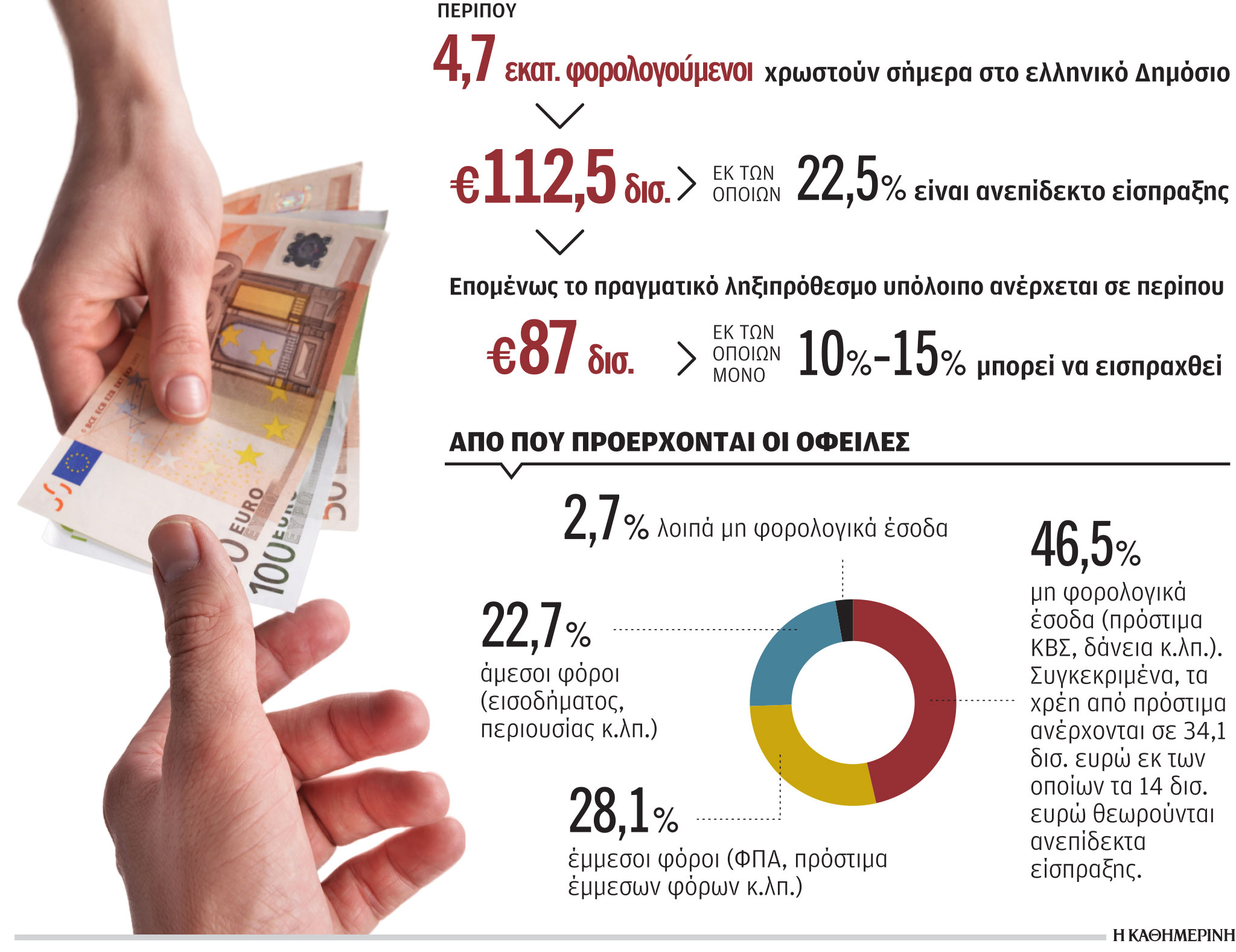
Activation of the Eispraxis electronic system will help the tax inspectorate to obtain data on assets (movable property and real estate) owned by state debtors. In cases where, after an in-depth audit, the absence of assets is established, the tax inspectorate will stop pursuing them, and their debts will be entered in a special book of bad debts and written off on conditions, but after ten years they have disappeared. Today, approximately 4.7 million taxpayers owe the Greek state. The total amount is 112.5 billion euros, most of which is considered uncollectible, and only 5.3 billion euros is in the calculations. From the overdue balance:
• 46.5% relate to non-tax revenues (CBS fines, loans, etc.). In particular, debts for fines amount to 34.1 billion euros, of which 14 billion euros are considered bad.
• 28.1% relates to indirect taxes (VAT, penalties on indirect taxes, etc.).
• 22.7% are direct taxes (profit taxes, property taxes, etc.).
• 2.7% relate to other non-tax income.
Of the total amount of overdue debts, 22.5% are classified as uncollectible. Therefore, the actual arrears are about 87 billion euros. But even this is extremely difficult to assemble. It is estimated that only a percentage of the order of 10-15% can go to the state treasury. The older the debt, the harder it is to collect. And for this reason, the efforts of the tax mechanism are directed to the newest debts. It has been established that the longer debt collection actions are delayed, the smaller the amount can be recovered.

But how are bad debts characterized? According to the tax office, you must:
1. The investigations were completed on the basis of the relevant electronic means available at the time of the tax administration, and these investigations did not establish the existence of the assets of the debtor and co-debtors, or the sale of their assets in any way took place. established that are not subject to cancellation or violation in accordance with Articles 939 et seq. of the Civil Code, and in particular it is established that enforcement proceedings in respect of movable and immovable property or claims against the above responsible persons were expedited by the State or by third parties or by the liquidator in connection with with liquidation proceedings and suspension of bankruptcy proceedings, if the responsible persons are declared bankrupt, which has not been completed.
The operation of the Eispraxis electronic system will help the tax authorities obtain data on the property of debtors.
2. A petition for criminal liability has been filed in all cases where the legal conditions are met or it is not possible to file it.
3. The audit was carried out by a specially appointed auditor of the competent tax administration service, who, on the basis of a specially substantiated audit report, certifies that the conditions of previous cases have been met and the collection of debts is objectively impossible. from the debtor and co-executors.
From the day the debt is entered in the book of inadmissible collections and within ten years from the end of the year in which the entry was made, the following consequences occur:
• The limitation period for debt is automatically suspended.
• The debtor and all co-debtors, for whatever reason, are not provided with proof of knowledge of taxes, except when it comes to collecting money that will be allocated to the satisfaction of the state.
• The debtor and all co-debtors are not issued another asset transfer certificate.
• Bank and investment accounts and the contents of deposit boxes in banks or other credit institutions of these persons are frozen in full.
The state reserves the right to take all foreseen coercive or non-coercive measures and to make a set-off in case of establishing the presence of assets and after entering the debt into a special book of unacceptable collections upon its repayment. from this book and are reclassified as recoverable if, before the expiration of the limitation period, it is established that the debtor or co-debtor has or has acquired property that makes it possible to partially or fully repay the debt.
Source: Kathimerini
Lori Barajas is an accomplished journalist, known for her insightful and thought-provoking writing on economy. She currently works as a writer at 247 news reel. With a passion for understanding the economy, Lori’s writing delves deep into the financial issues that matter most, providing readers with a unique perspective on current events.